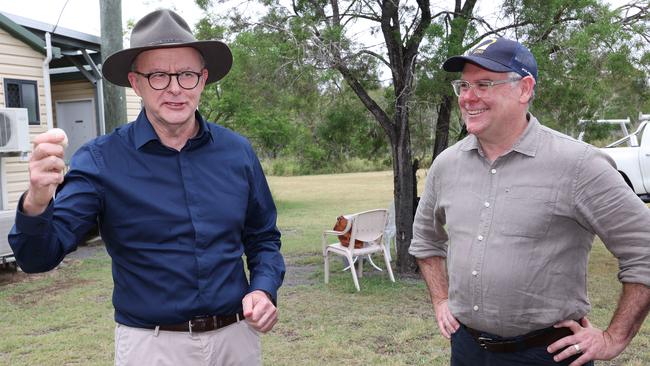Anthony Albanese’s $520m climate boost for the bush
Climate change resilience has been written into the $4.8bn Coalition-era Future Drought Fund investment framework, with $519.1m allocated to support farmers and regional businesses.

Climate change resilience has been written into the investment framework of the $4.8bn Coalition-era Future Drought Fund, with Anthony Albanese allocating $519.1m over four years to support farmers and regional businesses.
The Prime Minister, who will announce the climate-focused funding boost at Beef Week in Rockhampton on Tuesday, said his government would ensure rural and regional communities have “considered plans to make them more resilient to climate change”.
Ahead of next Tuesday’s budget, Mr Albanese and Agriculture Minister Murray Watt said the Morrison government did not acknowledge climate change was a driver of longer and more severe droughts when the FDF was established in 2019.
Following Australia’s last major drought between 2017 and 2019, the Morrison government established the FDF with a capital contribution of $3.9bn. As at March 31, the fund was valued at $4.8bn.
Mr Albanese will visit Beef Week with Senator Watt, Northern Australia Minister Madeleine King and Regional Development Minister Kristy McBain on Tuesday.
Peter Dutton will also travel to Beef Week on Tuesday and attend the Brahman judging.
With more than 12 million cattle across northern Australia, the live cattle export trade is valued at more than $1bn and directly employs 1527 people.
While the Bureau of Meteorology’s El Nino-Southern Oscillation alert system did not record drier El Nino events in April, the shift from the wetter La Nina seasons officially began in September last year.
Senator Watt said “we already are seeing very dry conditions in Western Australia and some parts of Tasmania”.
“Every morning when farmers around the country wake up, put their boots on and go to work, they are one day closer to the next drought. Time is of the essence when it comes to planning for drought, that’s why we’re investing heavily now in a new and improved Future Drought Fund,” Senator Watt said.
FDF programs currently include $235m for drought resilience adoption and innovation hubs, $137.4m for farm business resilience and climate services for agriculture programs and $120.3m to trial innovative solutions to build long-term resilience to drought and climate risks.
Farmers accessing FDF funds have used the money to trial new, drought-resistant livestock feed and access scientific advice assisting in reducing drought impacts.
Under the government’s changes from July 1, the FDF will help farmers mitigate the impact of drought, prepare communities to manage drought risks and increase investment across the existing eight drought hubs.
“We’re helping farmers across the country develop business plans to manage diversification in a changing climate,” Senator Watt said. “We are helping regional communities manage drought and other climate risks, and helping individuals get leadership training and mentoring.”
Mr Albanese said it was vital “we support Australian farmers and producers to be prepared for more severe weather impacts”.
“By doing the work now, our rural and regional communities are not just reacting to events as they unfold, but will have considered plans to make them more resilient to climate change.”
The FDF shake-up follows last year’s National Drought Forum and Productivity Commission review that said “drought is just one of the risks from climate change that farmers and agricultural communities face”.
“While drought should remain the focus, the FDF should explicitly recognise climate change resilience to confirm that, where appropriate, programs address a broader range of climatic risks,” the PC report states.
In addition to the FDF supporting locally-led responses to economic, environmental and social pressures, the review called for the establishment of an Aboriginal and Torres Strait Islander working group to ensure Indigenous Australians benefit from the fund.




To join the conversation, please log in. Don't have an account? Register
Join the conversation, you are commenting as Logout